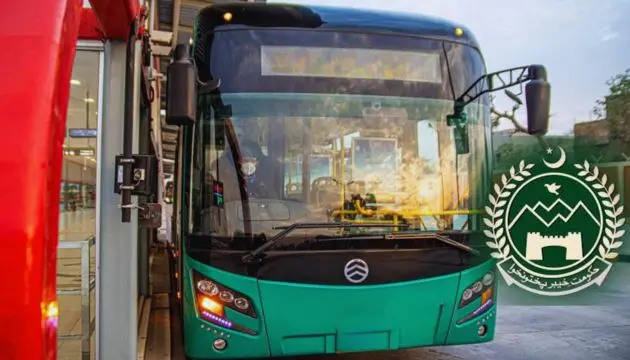PESHAWAR: The Khyber Pakhtunkhwa cabinet has approved the purchase of 50 new diesel-hybrid buses for the Peshawar Bus Rapid Transit (BRT) system at an estimated cost of Rs3.2 billion.
According to the details, the approval was given during the 34th cabinet meeting chaired by Chief Minister Ali Amin Gandapur. According to an official statement, the decision was made due to the increasing number of passengers and the expansion of BRT routes from six to eight.
Trans Peshawar earlier had 220 buses, and 24 more were added in 2022, bringing the total fleet to 244. With this new addition, the BRT system aims to improve services for commuters.
The cabinet also approved merging four campuses of the ZamungKor Institute — in Swat, Dera Ismail Khan, Abbottabad, and the Girls Campus in Peshawar — into the main autonomous institute in Peshawar. Currently, 600 children are enrolled at the Peshawar campus and 425 in the regional campuses.
As part of pension reforms started in 2015, the cabinet approved an agreement with Pak Qatar Asset Management under the Contributory Provident Fund Rules, 2022. The aim is to shift from an unfunded pension system to a funded one by investing government and employee contributions through SECP-approved companies.
— ALSO READ —
KP government plans transition to funded pension system by 2045
Amendments to the Right to Public Services Act, 2014, were also approved to strengthen coordination among departments, promote e-governance, and increase transparency. A clause for reasonable accommodations for marginalized groups was also included.
The cabinet also approved changes to the Public-Private Partnership (PPP) Rules, reducing the bidder response time from 60 to 30 days. A committee will review the Public Lands Utilization and Management Bill, 2025.
Additionally, the cabinet passed the KP NGO (Human Rights) Rules, 2025, and sanctioned Rs124 million to resume salaries for PERRA’s contract staff until June 30, 2025, after which termination notices will be issued. The PERRA Director General was told to resolve all pending issues.
Major health projects also received revised funding. The cost of the Category-C Hospital in Balakot rose from Rs575 million to Rs924.596 million.
The budget for rehabilitation of Rural Health Centres (RHCs) increased to Rs1.707 billion, while Basic Health Units (BHUs) saw a boost from Rs1.652 billion to Rs2.961 billion. The Peshawar Institute of Cardiology was granted Rs346 million to buy modern equipment.
The cabinet also lifted a ban on vehicle procurement and allowed the purchase of two official vehicles for district and sessions judges in Mohmand and Khyber.
The 2024–25 annual budget of the Pakhtunkhwa Highway Authority was approved, along with the revival of an ADP scheme to support research at Islamia College University, Peshawar.
— ALSO READ —
Govt to set up 2,000 EV charging stations, launch 600 electric buses
Funds worth Rs1.5 billion were sanctioned for transformer repairs in different districts. A supplementary grant of Rs1.041 billion was approved to pay electricity dues of PESCO and cover liabilities of TMAs and WSSCs. Another Rs400 million was allocated to repair water infrastructure under the Irrigation Department.
The cabinet included Makniyal in the Urban Area Development Authority (UADA), Haripur, and formed a committee to monitor efforts to stop illegal tree cutting in the Arandu Gol Forests of Chitral and Upper Kohistan.
Rubab Mehdi was appointed as the new Ombudsperson for Protection Against Harassment of Women at the Workplace in KP.
The cabinet also approved outsourcing of tobacco cess collection (excluding factories) and hiring a lawyer for a Supreme Court case related to narcotics.
Separately, the Khyber Pakhtunkhwa Urban Mobility Authority announced a 10% increase in BRT fares, raising the minimum fare from Rs20 to Rs30. However, fares for express routes, which have a fixed rate, remain unchanged.













